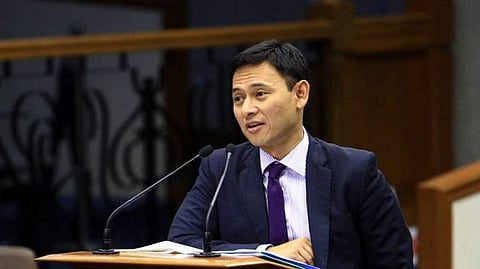
- NEWS
- the EDIT
- COMMENTARY
- BUSINESS
- LIFE
- SHOW
- ACTION
- GLOBAL GOALS
- SNAPS
- DYARYO TIRADA
- MORE

Senator Sonny Angara on Saturday reiterated the Tatak Pinoy law is crucial to reducing red tape activities in the country.
Angara said the red tape continues to hamper the flourishing of investments in the Philippines.
"Bureaucratic red tape has long been the gripe of foreign investors who have either done business before or are about to do business in the Philippines," he further stressed.
Angara cited the German Ambassador to the Philippines Andreas Pfaffernoschke's remarks that red tape became the biggest hindrance for foreign businesses to expand their investments in the Philippines.
The ambassador lamented that foreign businessmen often complain about many permits needed to be acquired and corruption in various institutions.
"Over the years we have seen improvements in dealing with the issue of red tape, including the enactment of the Republic Acts 9485 or the Anti-Red Tape Act (ARTA) and 11032 or the Ease of Doing Business (EODB) Act, both of which aim to speed up transactions with government. These are good laws but clearly, a lot more has to be done," said Angara.
For its part, the ARTA instituted the no-noon break policy, no fixing activities, easy-to-read IDs or nameplates, and presence of public assistance and complaints desks.
It also strictly implemented the Citizen's Charter, making people aware of an agency's frontline services offered, along with the step-by-step procedure including the point person responsible for each step, time needed to transact, documents required, and fees.
The Ease of Doing Business (EODB) Law, on the other hand, sets the "3-7-20" rule, which requires government offices to complete simple transactions within three days, while the complex ones should be done within seven days, and highly technical ones within 20 days.
Angara, Tatak Pinoy Act's principal author and sponsor, is optimistic that the law would address the concerns of investors.
"We can see the entry of more key investments that will help spur economic development and bring more opportunities for our people," he added.
The Section of the law provides for the creation of green lanes for Tatak Pinoy investments which would expedite and streamline the processes and requirements for the issuance of permits, licenses, certifications, or authorizations.
The export green lane facility will prioritize qualified exporters for advanced processing and clearances of their export requirements, including the importation of critical raw materials and capital equipment under the Bureau of Customs (BOC), Food and Drug Administration (FDA), and other regulatory authorities.
Last month, President Ferdinand Marcos Jr. signed the Tatak Pinoy Act into law to better support local industries and associate the Filipino brand with high-quality products.
Senator Joel Villanueva earlier noted that the Tatak Pinoy Act will complement the Trabaho Para Sa Bayan (TBP) Act which aims to create a national masterplan to address unemployment, underemployment, and youth unemployment in the country.
Angara said the Tatak Pinoy Act also institutionalizes Marcos' Executive Order No. 18, issued last year for the establishment of green lanes for strategic investments.
"The common goal is to welcome more investments into the country and not to discourage them with the tedious processes and requirements that greet them in the bureaucracy," Angara said.
"We are competing with our geographical neighbors for these investments that not only bring in a considerable amount of capital but also the technology and know-how that can only benefit our country and its people," he added.
